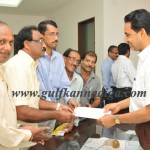 The Geological Survey of India on Wednesday got a major boost to its mineral exploration capability with the acquisition of the country’s first helicopter for aerial survey.
The Geological Survey of India on Wednesday got a major boost to its mineral exploration capability with the acquisition of the country’s first helicopter for aerial survey.
Called ‘Garuda Vasudha’, the Rs. 63-crore specially equipped copter will be used to locate important minerals up to a depth of 300 metres across vast swathes of the country, GSI’s Director-General S.K. Wadhawan said.
He was speaking after receiving the documents of the helicopter from its manufacturer, Hindustan Aeronautics Ltd. HAL has fitted its Dhruv advanced light helicopter with a Heli-borne Geophysical Survey System comprising four Canadian sensors.
Union Minister for Mines Dinsha Patel, who formally ushered the helicopter into service via teleconference from Delhi, said the copter should be used to get maximum economic benefits.
Dr. Wadhawan said India joins six countries that have heli-borne geo-survey systems. “We have been aspiring for such a technology infusion for making a more concerted effort in locating deeply buried, concealed mineral deposits beyond conventional methods,” he said.
GSI would deploy the copter in the coming days over already tested areas in Aladahalli in Shimoga, which are known for gold, copper, base minerals, and some strategic minerals, he later said on the sidelines of the event.
According to HAL Chairman R.K. Tyagi, even 1 per cent benefit from geo-surveys using an indigenous helicopter, could potentially amount to cutting the petrol import bill by Rs. 5,000 crore.
According to Joint Secretary, Ministry of Mines, D.S. Mishra, barely 10 per cent of 5.7 lakh sq. km of mineral-bearing areas have been explored. The survey helicopter would fly at a relatively low 100 m above ground, give sharper and faster data than manual methods.
Small aircraft and foreign helicopters have been used, but this would be far more efficient, extensive and can be used full time, said Additional Secretary R. Sridharan.
The instruments imported from Canada’s Pico Envirotec Inc at a cost of Rs. 18.5 crore include time domain electromagnetic, magnetic, spectrometric and gravimetric sensors, along with data acquisition systems.
Centre of excellence
Mr. Patel also laid the foundation stone for the GSI’s centre of excellence in Bangalore.
As part of its modernisation plan, the Centre will have advanced devices and software to analyse ore deposits. It will boost Earth Sciences research in the south. Two other centres are in Kolkata and Faridabad.

